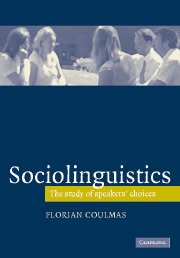Book contents
- Frontmatter
- Contents
- 1 Introduction: notions of language
- Part I Micro-choices
- Part II Macro-choices
- 7 Code-switching: linguistic choices across language boundaries
- 8 Diglossia and bilingualism: functional restrictions on language choice
- 9 Language spread, shift and maintenance: how groups choose their language
- 10 Language and identity: individual, social, national
- 11 Language planning: communication demands, public choice, utility
- 12 Select letters: a major divide
- 13 The language of choice
- Glossary of terms
- References
- Internet resources
- Index
- References
10 - Language and identity: individual, social, national
Published online by Cambridge University Press: 05 June 2012
- Frontmatter
- Contents
- 1 Introduction: notions of language
- Part I Micro-choices
- Part II Macro-choices
- 7 Code-switching: linguistic choices across language boundaries
- 8 Diglossia and bilingualism: functional restrictions on language choice
- 9 Language spread, shift and maintenance: how groups choose their language
- 10 Language and identity: individual, social, national
- 11 Language planning: communication demands, public choice, utility
- 12 Select letters: a major divide
- 13 The language of choice
- Glossary of terms
- References
- Internet resources
- Index
- References
Summary
At once, with contemptuous perversity, Mr Vladimir changed the language, and began to speak idiomatic English without the slightest trace of a foreign accent.
Joseph Conrad, The Secret AgentOne-dimensional social identities are not what they used to be … We all make choices about how seriously we take such identities, and many of us make choices about the identities themselves.
Walter Truett Anderson, Reality Isn't What It Used to BeBeliefs
A basic tenet of sociolinguistics is that language displays its speakers' identity. The stories of Eliza Doolittle and the Osaka samurai discussed in chapters 1 and 2, respectively, contain the same message: your language gives you away. This theme corresponds to strong popular beliefs about identity and language which on occasion take on rather peculiar forms. For example, when in March 2003, desperate to avert the imminent American attack on Iraq, Saddam Hussein granted CBS reporter Dan Rather an exclusive interview, the English translation of his remarks was aired in an Arabic-accented voice. The voice belonged to Steve Winfield, a professional speaker known for his skills in imitating accents. Upon inquiry, CBS declared the accent was chosen ‘to fit the nature of the broadcast’. This looks like an instance of rather bizarre logic, since it was unmistakably clear that Mr Saddam's statements were translated and hence not literally his words let alone his voice.
- Type
- Chapter
- Information
- SociolinguisticsThe Study of Speakers' Choices, pp. 171 - 183Publisher: Cambridge University PressPrint publication year: 2005

